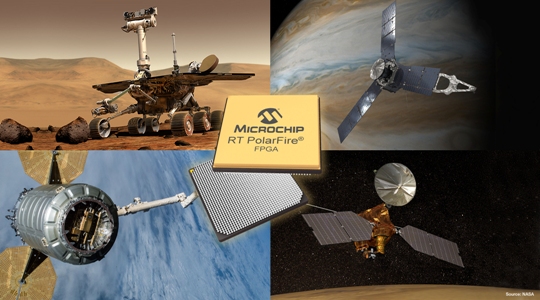FPGA will provide ability to process information for download links from satellite based experiments and tests
Microchip Technology is currently shipping engineering silicon for its RT PolarFire Field Programmable Gate Array (FPGA) while the device is being qualified to spaceflight component reliability standards. Designers can now create hardware prototypes with all the same electrical and mechanical performance that the space-qualified RT PolarFire FPGAs will provide for high-bandwidth on-orbit processing systems with low power consumption and the ability to withstand radiation effects in space.
These FPGAs increase computational performance so that satellite payloads can transmit processed information rather than raw data and make optimal use of limited downlink bandwidth.
They also enable more system complexity than previous FPGAs and withstand Total Ionising Dose (TID) exposure beyond the 100 kilorads (kRads) typical of most earth-orbiting satellites and many deep-space missions. Their power-efficient architecture reduces power consumption up to 50 percent compared to SRAM FPGAs, using SONOS configuration switches that also eliminate the problem of configuration upsets due to radiation in space.
According to Bruce Weyer, vice president of Microchip’s FPGA business unit, releasing RT PolarFire FPGA engineering silicon and beginning the spaceflight qualification process through full QML Class V standards is a major milestone for the company.
“Many of our customers have already jump-started satellite system payload development using our commercial PolarFire MPF500T FPGAs and now all prototyping can be done with silicon that will be identical in form, fit and function to our eventual flight-qualified RT PolarFire FPGAs,” he says.

